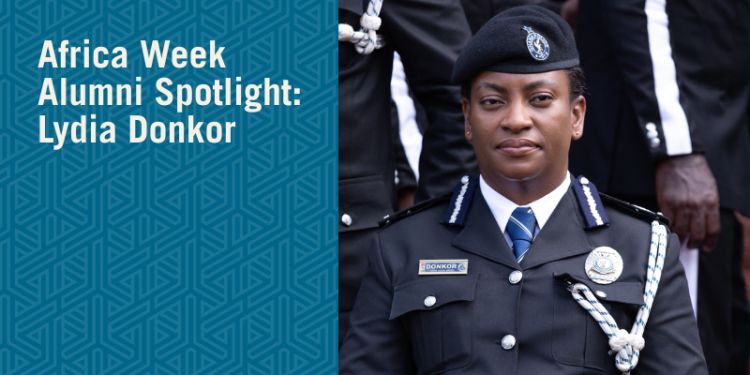Africa Week alumni spotlight: Lydia Donkor on leading Ghana’s criminal investigations and championing human rights

To mark Africa Week, School of Law alumna Lydia Donkor shares how her LLM in International and European Human Rights Law shaped her rise to Director-General of the Ghana Police Service’s CID.
In celebration of Africa Week, the University of Leeds School of Law is proud to spotlight alumna Lydia Donkor (‘07), whose career exemplifies the powerful intersection of legal education, human rights, and public service. Now Director-General of the Criminal Investigations Department (CID) of the Ghana Police Service, Lydia reflects on the pivotal role her time at Leeds played in shaping a career grounded in justice, discipline, and leadership.
From human rights advocate to national leader
“My love for human rights propelled me into reading law in the university and subsequently becoming a lawyer,” Lydia says, reflecting on what motivated her to study law. After becoming a lawyer, she joined the Ghana Police Service in 2003, where quickly found herself navigating international human rights work, liaising with organisations like the Commonwealth Secretariat on training programmes for West African police forces.
Her decision to pursue an LLM in International and European Human Rights Law was deeply personal and professionally strategic. Her boss at the time, the Inspector-General of Police, drew her attention to a Human Rights postgraduate degree and that immediately sparked her interest. The University of Leeds, a Chevening scholarship partner, stood out for its rigorous and relevant programme. “Choosing Leeds was no struggle at all. I found their programmes in Human Rights exciting,” she says.
Coordinating criminal investigations across Ghana
As Deputy Commissioner of Police and Director-General of the Criminal Investigations Department (CID), Lydia occupies one of the most critical roles within the Ghana Police Service. She oversees the country’s entire criminal investigation apparatus, comprising 34 specialist units.
“My primary role is to oversee all criminal investigations across the country,” she explains. “The CID handles functions such as firearm registration and licensing, document and fingerprint examination, forensic analysis, crime scene management, and Interpol duties.”
Each day begins before sunrise with updates from all 16 Regional Crime Officers. “I review highlights from their reports and give urgent directions – even before I step into the office.” Once on site, her day continues with meetings, responding to petitions, and managing national cases, often in direct communication with the Inspector-General of Police and Ghana’s Attorney-General’s Office.
“In simple terms, I coordinate all issues relating to criminal investigations in Ghana,” she says, summarising a role that requires judgement, leadership, and a strong commitment to justice.
Pioneering human rights training in Ghana’s Police Service
Reflecting on her career since graduating from Leeds, Lydia identifies a major milestone: mainstreaming human rights education within Ghana’s law enforcement training.
“It was important for me to ensure that all I had studied would be applied in my area of work,” she says. Combining her academic knowledge with practical experience gained through Commonwealth Human Rights Training programmes, she went on to design and implement human rights courses for police and sister security agencies.
“Prior to my education at Leeds, there was no mainstream programme on Human Rights in the Ghana Police Service. Upon my return, I designed and ran training courses in our training schools and the Police Academy, and I’m happy to announce that human rights have remained a part of our curriculum since.”
Beyond curriculum reform, Lydia has been a tireless advocate for gender equity within a traditionally male-dominated institution, “I have strived to put women in positions of higher responsibilities... and I am excited that those I’ve empowered continue to deliver exceptionally for the good of the Ghana Police Service and the country at large.”
Lessons in leadership from Leeds
Lydia credits her time at the University of Leeds School of Law with sharpening her leadership philosophy.
“At Leeds, everything was available to make the learning experience easy, materials, resources, everything was accessible,” she reflects. “I even remarked that if I had studied like this in my undergraduate days, I would have made first class.”
That formative experience has directly influenced her leadership style within the Ghana Police Service, “I understood that with the right environment and resources, people can actually achieve their utmost goals,” she explains.
As a leader, it is important to set clear targets for your subordinates or followers and not put impediments in their way to negatively affect their deliverables. It goes to show that with the right guidance and resources, people would give their best to achieve the needed results.
Words of wisdom for future leaders in Criminal Justice
For aspiring law students considering public service, Lydia advice, “One must exhibit a high level of professionalism, diligence and integrity. One cannot afford to be lazy or lackadaisical when it comes to criminal justice in the sense that there may be an innocent one seeking justices, and there may also be the one who has committed a crime and must face the law or even another who has wrongfully been accused of committing a crime.”
Additionally, Lydia highlights, “Cultivate a positive mindset to be able to derive that fulfilment of working for the state in the public sector or even in criminal justice in order not to give in easily to outside pressure which, in some cases, may include bribery. You must therefore uphold the highest-level of integrity in choosing to work in public service or criminal justice.”
Discover more alumni career journeys and see where a degree from the School of Law can take you, by clicking here.




